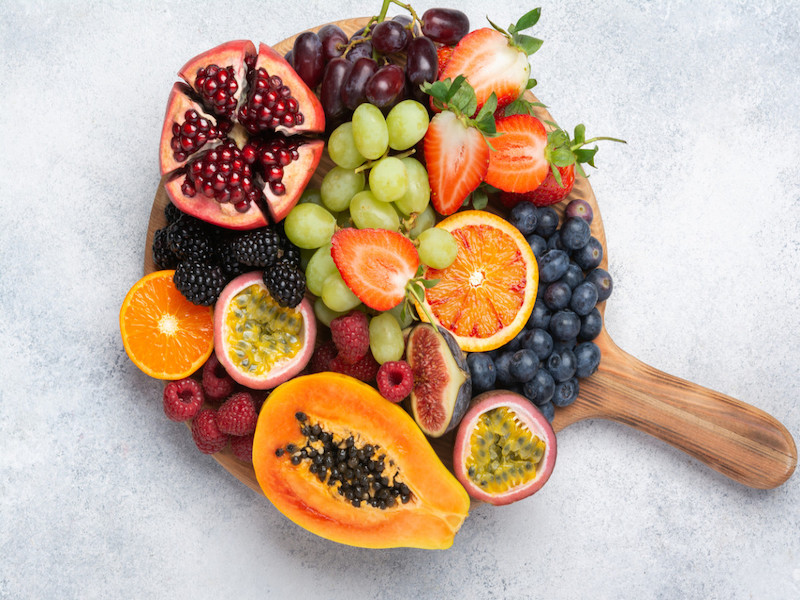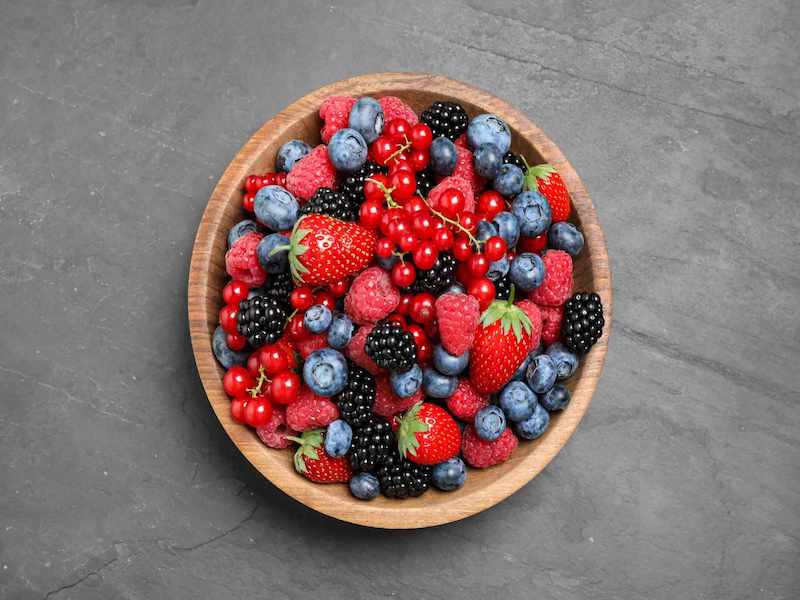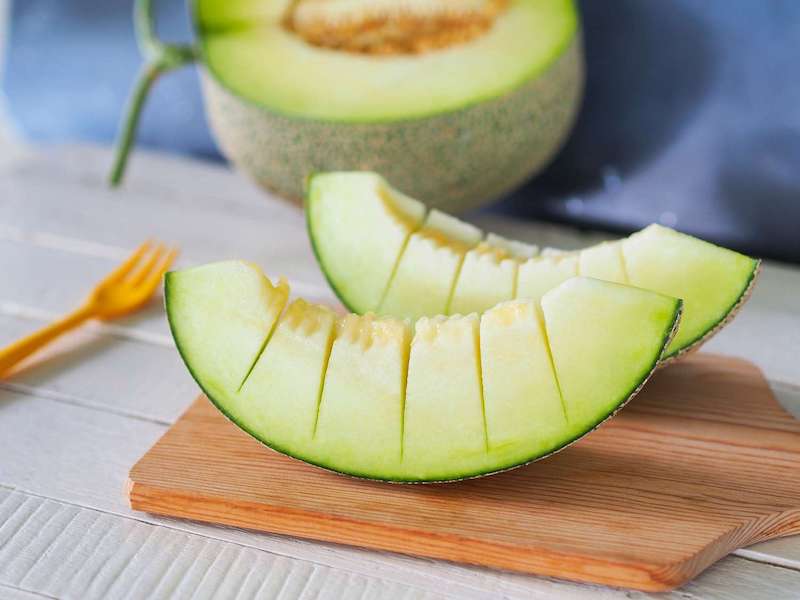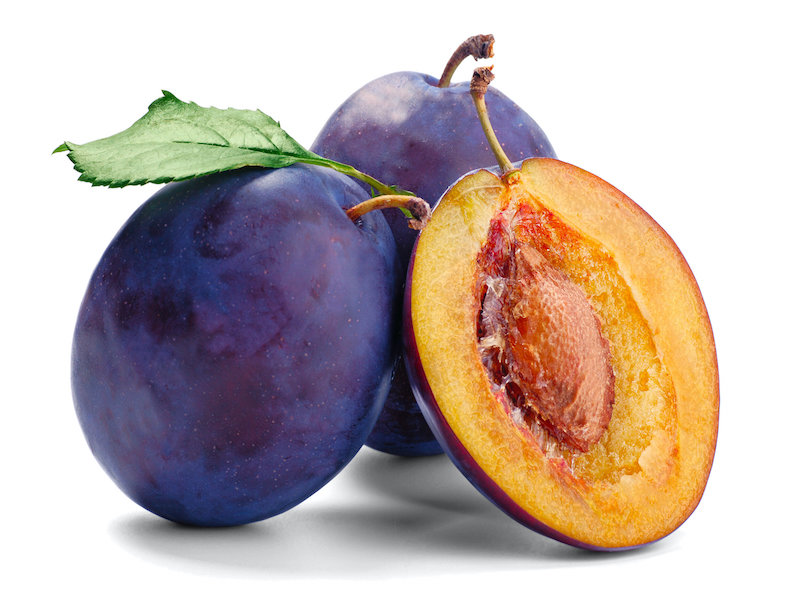
Answering questions: What are the best low-carb fruits?
Choosing the right fruits plays a vital role in a low-carb diet. Fruits often contain a lot of natural sugar but there are still low-carb fruits, helping you enjoy natural sweetness without worrying about gaining weight. The article below from Evaworlds will introduce a list of the best low-carb fruits, helping you make smarter choices for your diet.
What are net carbohydrates?
Some fruits have fewer carbohydrates per standard serving, either because of their higher water content or because they contain less absorbable carbohydrates because of their high fiber content. These absorbable carbohydrates are often referred to as net carbohydrates.

Fiber is a type of carbohydrate. However, our bodies cannot absorb it because it does not affect blood sugar like other carbohydrates. For this reason, some people consider net carbohydrates more important than total carbohydrates.
To calculate the net carbohydrate value of a food, subtract the grams of fiber it contains from its total carbohydrate content.
See more:
- Apple cider vinegar for weight loss?
- 20+ foods for the keto diet you should add to your diet to ensure effectiveness
- 7-day diet plan for weight loss you can refer to and implement immediately
List of the best low-carb fruits
Some specific low-carb diets recommend avoiding fruit, at least during certain phases of the diet. This is because fruit is typically higher in carbohydrates than most vegetables, as it contains more natural sugars.
If your doctor has advised you to avoid sugar or fructose (fruit sugar), you should follow his or her instructions. But if not, you can find ways to add fruit to your low-carb diet.
Here is a list of the best low-carb fruits.
Watermelon
This classic summer fruit has the lowest carbohydrate content. It has only 7.55 grams of carbohydrates per 100 grams of fruit. It is low in fiber, as most of the carbohydrates are absorbed by the body. It is also a good source of vitamin A and has a high water content, which helps you feel full while providing few calories. Even the rind is healthy!
Low-carb fruits Berries
Berries are a popular choice for carb watchers. Strawberries have the lowest carbs of all the berries, while blackberries have the lowest “net carbs.”

For every 100 grams of strawberries, you will provide your body with 7.68 grams of carbohydrates and 2 grams of fiber, equivalent to 5.68 grams of net carbohydrates.
Black Raspberry
Raspberries are also a great choice. They contain only 5.44 grams of net carbohydrates per 100 gram serving. They are also a good source of antioxidants, potassium, and vitamin C, among other nutrients. They also contain plant compounds that may help prevent certain chronic diseases.
See more:
- Weight loss diet and the best modes you should try
- Mediterranean diet cookbook you must read once
- The Mediterranean Diet Pyramid: The Secret to Health and Beauty
Melon
Orange melon is also a great fruit for hot summer days. The fruit contains 8.16 grams of carbohydrates and 0.9 grams of fiber per 100 grams of fruit, which equates to just 7.26 grams of net carbohydrates.
Melons are also considered low-fructose fruits. Try cantaloupe or honeydew melon with tuna salad. Try blending cantaloupe with lemon, mint, and water to create a refreshing “agua fresca.”
Low-carb fruits – Butter
Avocado is a low-carb fruit. Every 100g of avocado contains about 8.53g of carbohydrates and 6.7g of fiber, which is only 1.83g of net carbohydrates!
Plus, this serving of avocado will provide you with healthy monounsaturated fats, which are known to be good for your heart. You can slice avocado on top of salads or rolls, make an avocado and tomato salad, or pair it with hard-boiled eggs.
Honeydew Melon
Honeydew melon, another melon, contains 9.09 grams of carbohydrates and 0.8 grams of fiber per 100 grams, or 8.29 grams of net carbohydrates. The fruit is also a good source of vitamin C and potassium, an electrolyte needed to maintain stable blood pressure, pH balance, and a healthy metabolism. You might try honeydew melon wrapped in prosciutto for a sweet and savory appetizer.

Peaches
A sweet and juicy fruit, peaches are not very high in carbohydrates. Every 100g of peaches contains 10.1g of carbohydrates and 1.5g of fiber, which is only 8.6g of net carbohydrates. For a low-carb snack, pair them with some cottage cheese.
Lemons
Lemons are very low in carbohydrates, containing only about 6g of carbohydrates per 100g. Not only are they low in carbs, but they are also a great source of vitamin C. You can use them in juices or recipes.
See more:
- Vegan Diet: Benefits, notes, and reference menu
- The DASH Diet: Benefits, how to apply it effectively and safely
- A low carb diet: The secret to health and shape
Low-carb fruits – Mulberries
Mulberries contain about 9.8g of carbohydrates and 1.7g of fiber per 100g, which is only 8.1g of net carbohydrates. The fruit is also a good source of vitamin C and antioxidants, which can help improve overall health.
Guava
Guava is a high-fiber, low-carb fruit with only 14 g of carbohydrates and 5.4 g of fiber per 100 g, or about 8.6 g of net carbohydrates. It also contains vitamins C, A, and many important minerals.
Low-carb fruits Kiwi
Every 100 g of kiwi contains about 14.7 g of carbohydrates and 3 g of fiber, or about 11.7 g of net carbohydrates. Kiwi provides a large amount of vitamins C, E, and antioxidants, which are good for the immune system and skin.
Plum
Plums contain about 11.4 g of carbohydrates and 1.4 g of fiber per 100 g, or about 10 g of net carbohydrates. Plums are also rich in antioxidants and vitamin K, which help improve bone health and prevent aging.

Dragon fruit
Dragon fruit contains about 11 g of carbohydrates and 3 g of fiber per 100 g, which is only 8 g of net carbohydrates. Not only is it low in carbs, it is also rich in vitamin C, antioxidants, and other important minerals.
Green apple
Every 100 g of green apple contains about 13.8 g of carbohydrates and 2.4 g of fiber, which is about 11.4 g of net carbohydrates. Green apples are lower in carbs than red apples and have a slightly tart flavor, providing plenty of antioxidants and vitamin C.
Figs
Fresh figs contain about 19 g of carbohydrates and 3 g of fiber per 100 g, which is about 16 g of net carbohydrates. Fresh figs are lower in carbs than dried figs and are also rich in antioxidants, potassium, and calcium.
Oranges
Every 100 g of oranges contains about 11.8 g of carbohydrates and 2.4 g of fiber, equivalent to about 9.4 g of carbohydrates.













